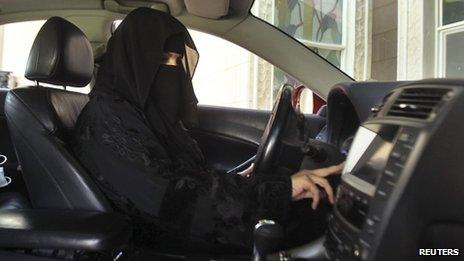Some Saudi women defy driving ban in day of protest
- Published
Woman driver Mai al Swayan: "I went to the grocery shop near my house... I accept the risk"
A handful of Saudi women have taken to the streets in their cars on a day of collective protest against the ban on female drivers.
Several videos of women driving have been posted online despite official warnings that women who took part risked sanctions.
Some women received warning phone calls from men purporting to be from the interior ministry.
But one woman who took part said she had faced no reprisals.
"I went to the grocery shop near the house... there was a reporter with me," Mai al-Sawyan told the BBC from Riyadh.
"Personally I know three other women" who also drove, she said.
"No-one approached me," she said, adding she was hopeful that the ban would be lifted soon.
But one leading activist - the university lecturer Aziza al-Yousef - said she had decided not to take part in the protest drive after being called by the authorities.
Saturday's protest is the third of its kind since 1990, after which a number of women were arrested or lost their jobs.
Police guidance
About 17,000 people signed a petition calling either for women to be allowed to drive or for an explanation of why the prohibition should remain in force.
An interior ministry spokesman, Mansour al-Turki, considerably toughened the Saudi government line on the women drivers' campaign on Thursday.
Mr Turki explicitly restated that women were prohibited from driving, with violators - and their supporters - likely to face unspecified measures.

Some Saudi women who took part in the 1990 protest were arrested
A campaign activist, Zaki Safar, said that this was an unusually explicit statement of the ban, which is informal rather than enshrined in Saudi law.
The BBC has seen a document advising police on how to handle women drivers.
It suggests police take them into a side street. There police should issue them and their male guardians with a warning, and make them promise not to drive again.
The car keys should be given to the women's male guardians, the document says.
But the authorities' apparent failure to act to enforce the ban on Saturday has added to activists' conviction that the government is sending mixed messages as it is itself divided over whether to lift the ban.
Earlier this week, about 100 conservative clerics asked for an audience at the royal court in the capital, Riyadh, to denounce the campaign as a conspiracy by women and a threat to the country.
But there have been indications of a less hard-line attitude by the authorities than back in 1990, and at the second protest in 2011.
As part of the latest campaign, dozens of women have posted online videos of themselves driving in different Saudi cities. No-one has been arrested.
The activists behind the campaign believe the public mood is changing, with many more people - including an increasing number of men - publicly supporting the lifting of the ban.
- Published26 October 2013
- Published29 September 2013
- Published9 July 2013
- Published25 May 2013
- Published2 December 2011